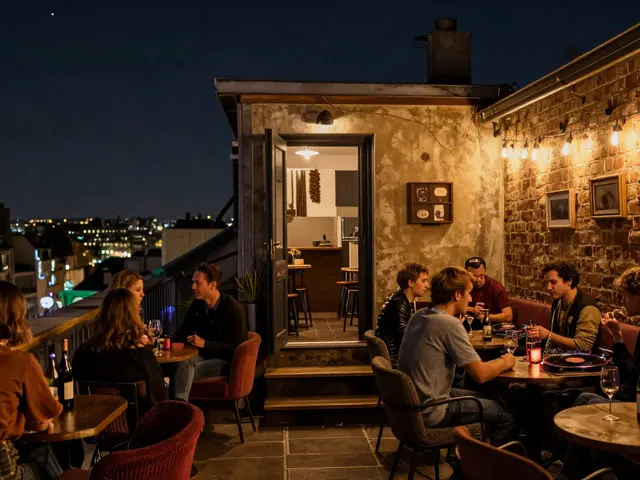When you think of Berlin, you might picture street art in Kreuzberg, techno clubs in Friedrichshain, or the quiet grandeur of Museum Island. But over the last five years, something quieter - and more private - has been growing in the city’s shadows: independent escorts offering high-end companionship that doesn’t fit the old stereotypes.
It’s Not What You Think
Most people still picture escort services as something hidden in back alleys or shady websites. That’s not what’s happening in Berlin anymore. The new wave of independent escorts are professionals who run their own businesses - with websites, clear pricing, and boundaries. They’re lawyers, artists, linguists, and former corporate employees who chose this path for control, flexibility, and income.According to a 2024 survey of 127 independent escorts in Berlin, 78% reported earning between €150 and €450 per hour. Nearly 60% said they work fewer than 15 hours a week. That’s not survival work. That’s lifestyle design.
What’s different now is the shift from transactional encounters to curated experiences. Clients aren’t just looking for sex. They’re looking for conversation that doesn’t feel scripted, for someone who knows how to navigate a Michelin-starred dinner without awkward pauses, or for a companion who can hold their own at a gallery opening in Mitte.
Why Berlin? The Perfect Storm
Berlin has always been a city that tolerates - even celebrates - unconventional lifestyles. But the rise of independent escorting here isn’t just about liberal attitudes. It’s about practical conditions.First, the cost of living is still lower than in Paris, London, or Zurich - but the income potential is higher than in most other German cities. Second, there’s no legal requirement to register as a sex worker. As long as you’re not running a brothel or advertising in public spaces, you’re operating in a legal gray zone that’s widely ignored by authorities.
Third, the client base is diverse and growing. Tech entrepreneurs from Hamburg, diplomats from the U.S. Embassy, executives from Swiss banks, and even retirees from Austria are all seeking discreet, high-quality companionship. Many of them have tried dating apps and found them shallow. Others just want someone who doesn’t ask for anything beyond presence.
One escort, who goes by the name Lena, told me: “I don’t sell time. I sell atmosphere. My clients pay for the feeling that they’re being seen - not just physically, but intellectually. That’s worth more than a bottle of champagne.”
The New Rules of Engagement
The old model - meet at a hotel, pay cash, leave - is fading. Today’s independent escorts in Berlin operate like boutique service providers.- Clear boundaries: No last-minute requests. No alcohol-fueled encounters. No public meetings.
- Professional platforms: Most use private booking sites with encrypted messaging, not social media or public classifieds.
- Curated profiles: Photos are tasteful, bios are thoughtful. Many include language skills, hobbies, and areas of expertise - “fluent in Mandarin,” “trained in classical piano,” “loves hiking in the Tegel Forest.”
- Structured services: Options range from €200 for a 90-minute dinner and walk, to €800 for a full day that includes theater tickets, a private wine tasting, and a night at a luxury hotel.
One client, a 42-year-old software engineer from Munich, described his experience this way: “I booked someone for a weekend in Potsdam. We didn’t have sex. We talked about quantum computing, ate duck confit at a Michelin-starred place, and watched the sunrise over the Sanssouci Palace. I didn’t feel lonely anymore. That’s what I paid for.”

Who Are These Women (and Men)?
The majority are women, but the number of male and non-binary escorts in Berlin has grown by 37% since 2022, according to industry estimates. Many come from educated backgrounds. A 2023 study by the Berlin Institute for Social Research found that 41% of independent escorts in the city hold university degrees - in fields like international relations, psychology, or fine arts.They’re not running from trauma. They’re building careers.
Some have moved here from other countries - Romania, Ukraine, Brazil - attracted by Berlin’s relative freedom and higher pay. Others are locals who left corporate jobs after burnout. One former marketing director now works as a companion for wealthy expats, saying, “I used to spend 12 hours a day convincing people they needed things they didn’t. Now I spend 4 hours a week being real with people who want to be real back.”
The stigma hasn’t vanished - but it’s cracking. Some escorts now speak publicly on podcasts or write essays under pseudonyms. A few have even published memoirs. The tone isn’t defensive. It’s matter-of-fact: “I chose this. It’s work. It’s honest.”
What Clients Are Really Looking For
It’s easy to assume clients want physical intimacy. But the data tells a different story.A 2025 analysis of 2,100 bookings in Berlin showed:
- 63% of sessions involved no sexual contact
- 81% of clients requested conversation as the primary focus
- 54% chose companions based on shared interests - books, travel, philosophy
- Only 12% asked for a “standard” service
What’s in demand? Emotional intelligence. Cultural fluency. Discretion. The ability to be present without judgment.
One escort, who works with diplomats and their families, said: “I’ve had clients cry in my car after a diplomatic meeting. They didn’t want advice. They didn’t want me to fix it. They just wanted someone to sit with them while they processed it. That’s not a service you find on Tinder.”
The Risks and the Realities
This isn’t a fairy tale. There are risks.Some escorts face harassment from clients who think they’re entitled to more than they paid for. Others deal with online doxxing or threats from anti-prostitution groups. A few have been targeted by journalists looking for “shocking stories.”
But the most common challenge isn’t danger - it’s isolation. Many work alone. No HR department. No sick days. No pension. One escort, who’s been in the industry for seven years, keeps a spreadsheet of every client she’s worked with, every payment, every boundary she’s set. “I have to be my own lawyer, my own accountant, and my own therapist,” she said.
There’s no union. No safety net. That’s why many are pushing for legal recognition - not as sex workers, but as independent service providers. Some have formed collectives to share resources, legal advice, and emergency contacts.

What This Means for Berlin
The rise of independent escorting isn’t just about sex. It’s about what happens when people reclaim control over their labor in a city that values autonomy.Berlin has always been a place where people come to escape rigid structures - whether it’s the East German past, the corporate grind, or traditional gender roles. Now, a new group is doing the same thing: choosing how they work, who they work with, and what they’re paid.
They’re not breaking the rules. They’re rewriting them.
And in a city that prides itself on being different, that’s not scandalous. It’s just another kind of Berlin innovation.
How to Spot the Real Ones
If you’re looking for a legitimate, high-end companion in Berlin, here’s what to watch for:- No public social media: Legitimate escorts rarely post on Instagram or Facebook. Their presence is private and professional.
- Clear pricing: Rates are listed upfront. No vague phrases like “negotiable” or “special rates.”
- Booking system: They use secure platforms, not WhatsApp or Telegram for initial contact.
- Focus on experience: Their profile highlights interests, language skills, and past experiences - not just photos.
- No pressure: They don’t push for meetings or demand personal details before a booking.
If someone asks you to send money upfront, meet in a public park, or doesn’t have a professional website - walk away. This isn’t the underground. It’s a professional service. And professionals don’t operate like street vendors.
What Comes Next?
The next five years will likely see more escorts in Berlin forming cooperatives, lobbying for legal protections, and even offering training for newcomers. Some are already teaching workshops on client boundaries, financial planning, and mental health.There’s also a quiet shift in public perception. Younger Germans - especially those in their 20s and 30s - are less judgmental. They see it as another form of freelance work, like graphic design or content creation. The difference? It’s more personal.
And maybe that’s the real story. In a world where everything feels transactional, people are paying for authenticity. And in Berlin, someone’s figured out how to sell it.
Are escort services legal in Berlin?
Yes, but with important limits. In Germany, selling sexual services is legal, but organized prostitution - like brothels or pimping - is not. Independent escorts who work alone, set their own hours, and use private booking systems operate in a legal gray zone that’s generally tolerated. As long as they don’t advertise publicly or run a business with multiple workers, they’re not breaking the law.
How much do independent escorts in Berlin earn?
Most earn between €150 and €450 per hour, depending on experience, language skills, and the type of service. Full-day bookings (6-8 hours) can range from €800 to €2,000. Many work only 10-15 hours a week, making their annual income comparable to mid-level corporate jobs - without the 40-hour workweek.
Do these services involve sex?
Not always. In fact, over 60% of bookings in Berlin in 2025 involved no sexual activity. Clients often pay for conversation, companionship at events, or simply someone to be present with - whether it’s for dinner, a museum visit, or a quiet evening at home. Sex is an option, but it’s not the default.
How can someone become an independent escort in Berlin?
There’s no formal training or license. Most start by building a professional website with clear boundaries, pricing, and services. They use private booking platforms, avoid social media, and prioritize safety. Many join online communities for advice on contracts, client screening, and legal protections. The key is professionalism - not secrecy.
Are male or non-binary escorts common in Berlin?
Yes. While the majority are women, the number of male and non-binary escorts has grown significantly since 2022. They serve a diverse client base, including LGBTQ+ individuals, male executives seeking non-sexual companionship, and women who prefer male companions. Their services are structured the same way - focused on experience, discretion, and professionalism.
Is this just a trend, or is it here to stay?
It’s not a trend. It’s a structural shift. As more people seek control over their work, and as traditional jobs become less fulfilling, alternative income paths are growing. Berlin’s culture of autonomy, combined with its international client base and relatively low legal risk, makes it a hub for this kind of work. It’s likely to expand - not disappear.








